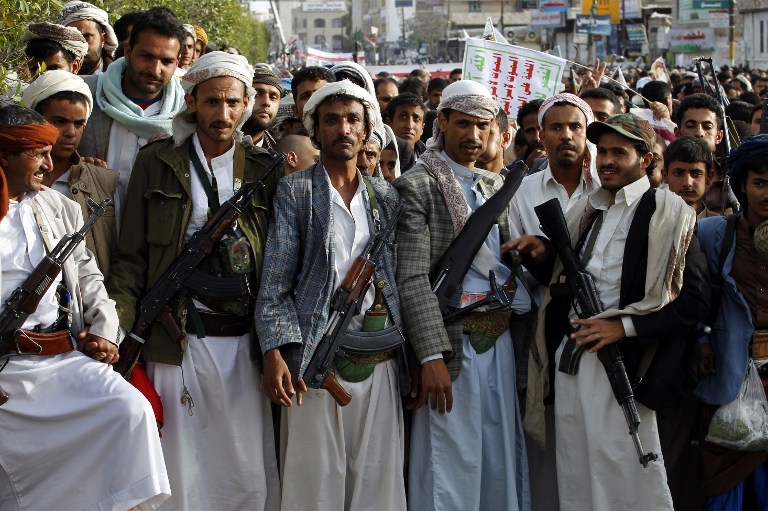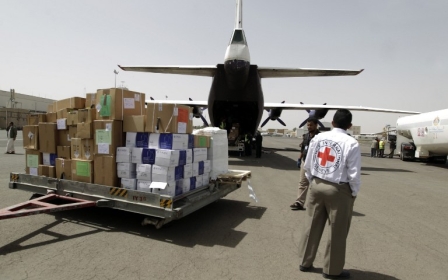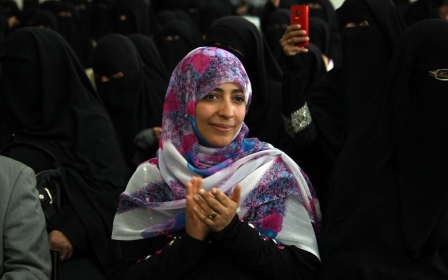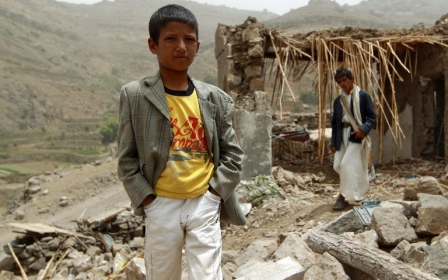Aden snipers kill 'elderly woman and child' as death toll climbs: reports

Fierce fighting between Shiite Houthi militias and government forces in southern Yemen killed at least 25 people overnight, military and medical officials said on Saturday, with snipers claiming some civilian victims.
The clashes were followed by a wave of pre-dawn air strikes by a Saudi-led coalition against Houthi positions in Aden, the main southern city in conflict-hit Yemen. The Saudi-led coalition warplanes also bombed military sites belonging to the Houthis in Yemen's western al-Hudayda city on Saturday, eyewitnesses said.
"The airstrikes targeted an airbase and two Houthi-controlled military sites in the city," an eyewitness told the Anadolu Agency. The extent of the damage caused by the raids is at present unknown.
In Aden, street fighting between the Houthis and forces loyal to President Abed Rabbo Mansour Hadi cost the lives of at least seven combatants in a 12-hour period, said a health official in the city.
An elderly woman, a man and a child were also shot by Houthi snipers, the official said.
Residents and officials in Aden said the city was pounded after Houthi militias and renegade soldiers loyal to former president Ali Abdullah Saleh reached the city's northern entrance.
"The raids began at around 10:00 pm [1900 GMT] on Thursday and were the most violent since the start of 'Operation Decisive Storm'," a resident told AFP, referring to the Saudi air offensive against the Houthi militias.
Residents also said aircraft of the Saudi-led coalition of Arab states targeted other positions, including a city centre stadium and rebel-manned checkpoints.
In Riyadh, coalition spokesman Brigadier General Ahmed al-Assiri told reporters the latest raids targeted militia camps in nine towns across Yemen.
In the most direct American criticism yet of Iran's alleged support for the Houthi militias, Secretary of State John Kerry said Thursday the United States would not accept foreign interference in Yemen.
"There have been - there are, obviously - flights coming from Iran. Every single week there are flights from Iran, and we've traced it and know this," he told PBS television. The US, however, has specifically sold weapons to the Saudi-led coalition and is officially providing at least tactical support to the coalition.
Separately, clashes and fatalities were reported in the Khor Maksar district of Aden held by the Houthis, while Sunni tribesmen who support Hadi ambushed and killed 12 Houthis on the road between Taez to Lahj as they made their way to Aden, military sources said.
To the east, hundreds of tribesmen gathered on Saturday around Ataq aiming to take over the city two days after it was overrun by Houthis and soldiers loyal to Saleh, tribal sources said.
The Houthi group has yet to comment on the claims.
Yemen has been left reeling in recent months as the Houthis have made gains throughout much of the country. They first managed to seize the capital Sanaa last September, when they forced the government to enact a list of political and economic concessions. In January, they stormed the presidential palace, placed Hadi under seeming house arrest, and dissolved the parliament.
When Hadi managed to flee to Aden in February, the Houthis stepped up their advance, south prompting Saudi Arabia to intervene. On 25 March, the Saudis announced that they would lead a coalition of Arab states in an aerial campaign against the Houthis.
The Houthis have called the offensive an unwarranted "Saudi-American aggression" against the Yemeni people.
Some Gulf States accuse Shiite Iran of supporting Yemen's Houthi, although the extent of this support has been widely debated.
Humanitarian aid
The spiralling violence has sparked a humanitarian crisis. The Red Cross and UN managed to fly medical aid into Yemen's capital Friday after Aden was battered by the heaviest night yet of Saudi-led air strikes targeting Shiite militias. The fighting had largely kept aid groups out until now.
The International Committee of the Red Cross said it dispatched an aircraft to Sanaa, its first aid shipment since the international campaign against the militias began last month.
"This is the first ICRC plane to have landed in Sanaa. It is loaded with 16 tonnes of medical aid," said Marie Claire Feghali, a Red Cross spokeswoman in Yemen.
The United Nations has called for a daily "humanitarian pause" of a few hours, saying aid was desperately needed in the conflict-ravaged country.
A UN humanitarian coordinator in Yemen, Johannes Van Der Klaauw, told reporters in Geneva that an "immediate humanitarian pause in this conflict" was desperately needed.
He insisted that the aid delivered to date was far from sufficient.
"The situation in Aden is extremely, extremely preoccupying, if not catastrophic," he said, warning that Yemen's second-largest city had fallen prey to "urban warfare" and "uncontrollable militias".
The World Health Organization said nearly 650 people have been killed and more than 2,000 injured in the fighting. Tthe actual number of fatalities is likely to be far higher since many people are not reaching hospitals and are being buried immediately, Van Der Klaauw said.
The UN children’s agency, UNICEF, said it had also airlifted 16 tonnes of aid to Sanaa, including medical supplies for 80,000 people as well as food supplements for 20,000 children.
"The supplies we have managed to bring in today can make the difference between life and death for children and their families," said UNICEF Yemen representative Julien Harneis.
Somali refugees flee Yemen
The situation is now so dire that Somali refugees who had sought refuge in the Gulf country have now begun going back to their own war-torn home, officials said Saturday, while the United Nations' refugee agency says the flow of refugees fleeing the Horn of Africa for Yemen has gone into reverse.
A boat carrying 260 Somali refugees, many of them women, children and the elderly, is the latest to dock at Somalia's Bossasso port in the Puntland semi-autonomous region.
"About 420 people have arrived previously and we are expecting many more," said Abdulahi Hashi, Puntland's deputy interior minister.
"In the past 10 days, some 900 people have crossed the Gulf Aden to Djibouti, Somalia's Puntland and Somaliland," said a statement by UNHCR, adding that those fleeing also included Yemenis.
Horn of Africa refugees accounted for nearly all of the 250,000 refugees registered in Yemen.
Puntland lies in Somalia's north, a largely peaceful but impoverished area that has suffered the knock-on effects of years of outright civil war further south.
In the southern parts of the Horn of Africa nation, African Union and Somali troops continue to battle al-Qaeda-linked Shebab insurgents.
New MEE newsletter: Jerusalem Dispatch
Sign up to get the latest insights and analysis on Israel-Palestine, alongside Turkey Unpacked and other MEE newsletters
Middle East Eye delivers independent and unrivalled coverage and analysis of the Middle East, North Africa and beyond. To learn more about republishing this content and the associated fees, please fill out this form. More about MEE can be found here.




